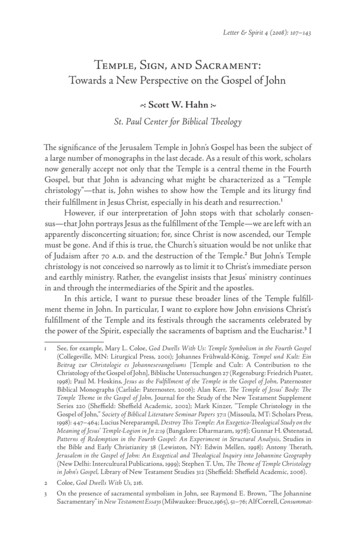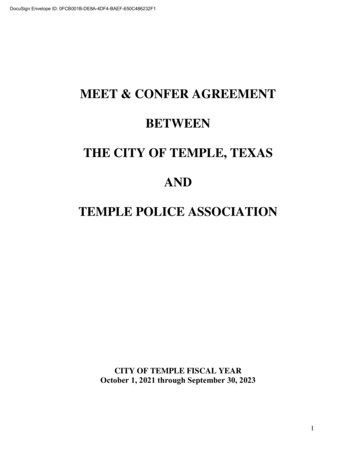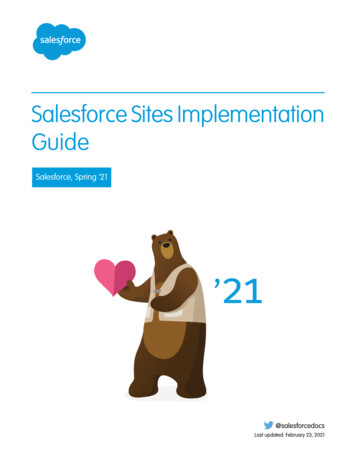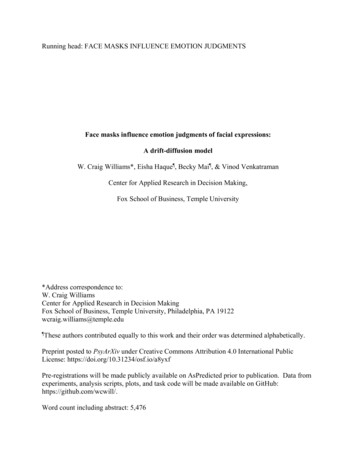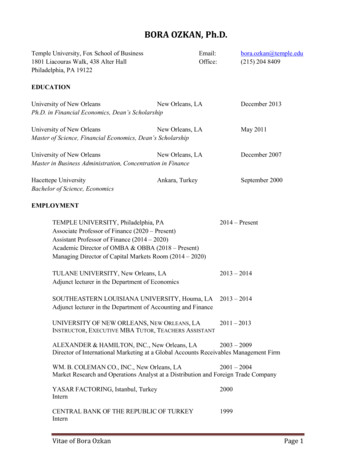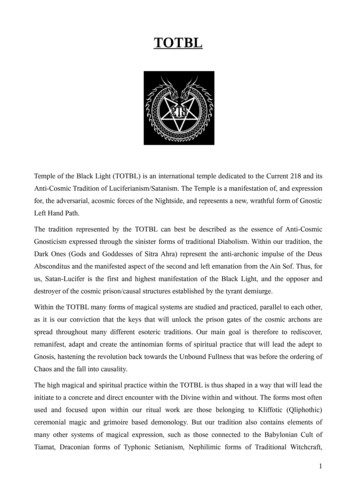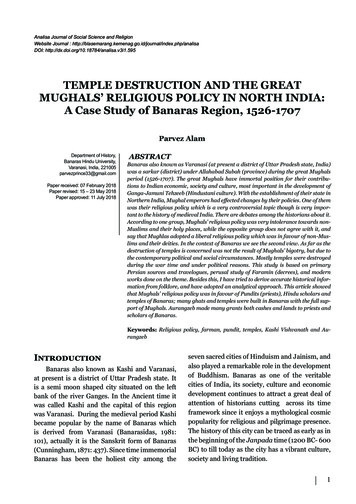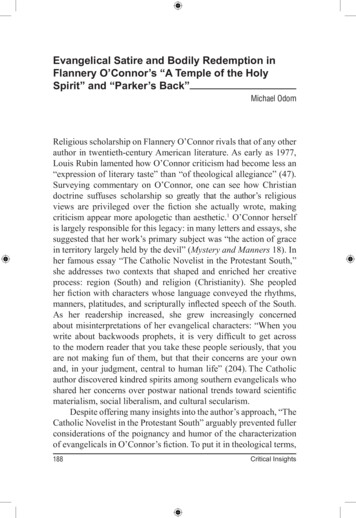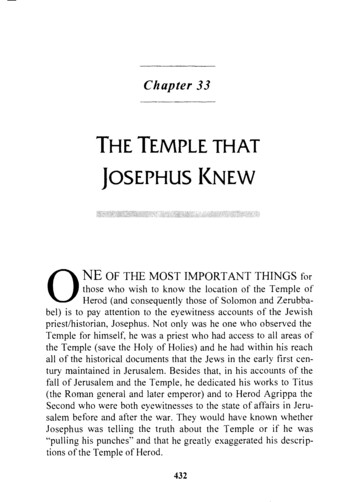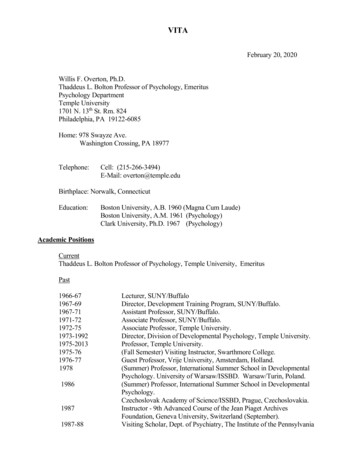
Transcription
VITAFebruary 20, 2020Willis F. Overton, Ph.D.Thaddeus L. Bolton Professor of Psychology, EmeritusPsychology DepartmentTemple University1701 N. 13th St. Rm. 824Philadelphia, PA 19122-6085Home: 978 Swayze Ave.Washington Crossing, PA 18977Telephone:Cell: (215-266-3494)E-Mail: overton@temple.eduBirthplace: Norwalk, ConnecticutEducation:Boston University, A.B. 1960 (Magna Cum Laude)Boston University, A.M. 1961 (Psychology)Clark University, Ph.D. 1967 (Psychology)Academic PositionsCurrentThaddeus L. Bolton Professor of Psychology, Temple University, cturer, SUNY/BuffaloDirector, Development Training Program, SUNY/Buffalo.Assistant Professor, SUNY/Buffalo.Associate Professor, SUNY/Buffalo.Associate Professor, Temple University.Director, Division of Developmental Psychology, Temple University.Professor, Temple University.(Fall Semester) Visiting Instructor, Swarthmore College.Guest Professor, Vrije University, Amsterdam, Holland.(Summer) Professor, International Summer School in DevelopmentalPsychology. University of Warsaw/ISSBD. Warsaw/Turin, Poland.(Summer) Professor, International Summer School in DevelopmentalPsychology.Czechoslovak Academy of Science/ISSBD, Prague, Czechoslovakia.Instructor - 9th Advanced Course of the Jean Piaget ArchivesFoundation, Geneva University, Switzerland (September).Visiting Scholar, Dept. of Psychiatry, The Institute of the Pennsylvania
3Hospital, Philadelphia, PA.Senior Research Scientist, The Institute of Pennsylvania Hospital,Philadelphia, PA.(Summer) Professor, International (Summer School in DevelopmentalPsychology. Karl Marx University/ISSBD. Leipzig, Germany.Instructor - 12th Advance Course of the Jean Piaget ArchivesFoundation, Geneva University, Switzerland (September).Director of Graduate Studies, Dept of Psychology, Temple UniversityChair, Department of Psychology, Temple UniversityInstructor - 19th Advance Course of the Jean Piaget ArchivesFoundation, Geneva University, Switzerland (June-July).Emeritus Professor, Temple UniversityProfessional Affiliations and AwardsAmerican Psychological Association Fellow, Division 7 (Developmental)Fellow, Division 12, (Clinical)Fellow, Division 20 (Adult Development & Aging).Society for Research in Child DevelopmentJean Piaget Society - President-Elect 1978-1979;President, 1979-80.International Society for the Study of Behavioral Development.Society for Research on AdolescenceSociety for the Study of Human DevelopmentAmerican Psychological Society - FellowLindback Foundation Award for distinguished teaching, 1982.Thaddeus Lincoln Bolton Professor of Psychology 2002Lifetime Achievement Award – Jean Piaget Society 2011."This award is presented in acknowledgement of a distinguishedbody of scientific work that has, over a lifetime career, contributedsignificantly to our understanding of cognitive development, andin acknowledgement of major and continuing contributions made tothe growth and success of the Jean Piaget Society."Society for the Study of Human Development -- President-Elect – 20112013; President - 2013-2015; Past President -2015Outstanding Faculty Service Award – Temple University – 2011Presented Philadelphia City Council Citation for “fine work and outstanding contributions”to the city of Philadelphia 1993Elected by Norwalk High School Alumni Association to the Association’s Wall of Honor inrecognition of outstanding career achievements 2002Awarded “Distinguished Lifetime Career Award” by the Society for the Study of HumanDevelopment. October 7 2017 Providence, R.I.
overton3StatuteEditorial and Professional ResponsibilitiesEditor, Monographs of the Society for Research in Child Development 1999-2006Member, Editorial Board of Human Development, 1974-1987 & 2002 -Member, Editorial Board Cognitive Development 2001- 2008Member, Editorial Board of International Journal of Behavioral Development. 1997-2002.Member, International Associates of the Archives Jean Piaget. 1996-2006Member, Editorial Board of Journal of Adult Development, 1993-.1997Member, Editorial Board of Journal of Experimental Child Psychology. Reappointed 19972002.Member, Editorial Board of Psychology Inquiry, 1989-2003.Member, Editorial Board of Journal of Research on Adolescents. Reappointed 1996-.1999Guest Editor, Journal of Experimental Child Psychology. Special Issue on Adolescence,1990.Associate Editor, Developmental Psychology, 1978-1986.Member, Editorial Board of Development & Psychopathology, 1988-1990.Member, Editorial Board of The Genetic Epistemologist, 1981-1990.Member, Editorial Board of Child Development, 1974-1977.Member, Editorial Board of Developmental Psychology, 1977-1978.Member, NIH Developmental Behavioral Sciences Study Section, July 1978- June 1982.Member, Policy and Planning Committee, Division 7, APA, 1978-1980.Member, Executive Committee, Division 7, APA, 1979-1982,1986-1989, 1991.Member, Credentials Committee, Division 7, APA, 1982-1985Member, Board of Directors, Jean Piaget Society, 73-78, 82-85, 88-90.Chair, Local Arrangements Committee, Jean Piaget Society, 1975-1991, 1993, 1996.Organizer of the 16th Annual Symposium of the Jean Piaget Society. Development ofThinking and Reasoning from Adolescence through Adulthood, Philadelphia, PA,May, 1986.Organizer of the 21st Annual Symposium of the Jean Piaget Society. The Nature andOntogenesis of Meaning, Philadelphia, PA, May, 1991.Member, Nomination Committee, Division 7, APA, 1989-1990, 1992.Chair, McCandless Young Scientist Award Committee, Division 7, APA, 1991.Member, McCandless Young Scientist Award Committee, Division 7, APA, 1992.Honorary Member, Board of Directors, Jean Piaget Society, 1992 - present.Chair, Selection Committee, E. Maccoby Book Award, Division 7, APA, 1996, 1997.Member, Selection Committee, E. Maccoby Book Award Division 7, APA, 1998.Chair, Division 7, APA, Golden Anniversary Celebration Committee, 1997.Member, Division 7 APA, Dissertation Awards Committee, 1999.Chair, Division 7, APA, Dissertation Awards Committee, 2000.Organizer of the 32nd Annual Meetings of the Jean Piaget Society: The Embodied Mindand Consciousness – Developmental Perspectives, Philadelphia, PA, June 2002.Organizer of the 8th Biannual Meetings of the Society for the Study of Human Development–Rethinking Developmental Science -- Fort Lauderdale, FL, Nov. 2013
4overtonPublications and PapersBooksOverton W. F. & Molenaar, P.C.M (Eds.). (2015). Theory and Method. Volume 1 of theHandbook of child psychology and developmental science. (7th ed.), Editor-inChief: Richard M. Lerner. Hoboken, NJ: Wiley.Overton, W. F. (Ed). (2010) Cognition, biology, and methods across the lifespan. Volume 1 ofthe Handbook of life-span development. Editor-in-chief: R. M. Lerner. Hoboken, NJ:Wiley.Overton, W. F., Mueller, U. & Newman, J. L. (Eds.), (2008). Developmental Perspectiveson Embodiment and Consciousness. Hillsdale, NJ: Erlbaum Associates.Overton, W. F. & Palermo, D. S. (Eds.), (1994). The Nature and Ontogenesis of Meaning.Hillsdale, NJ: Erlbaum Associates.Overton, W. F. (Ed.). (1990). Reasoning, Necessity, and Logic: DevelopmentalPerspectives. Hillsdale, NJ: Erlbaum.Overton, W. F. (Ed.). (1983). The relationship between social and cognitive development.Hillsdale, NJ: Lawrence Erlbaum.Overton, W. F. & Gallagher, J. (Eds.), (1977). Knowledge and Development: Advances inTheory and Research. New York: Plenum.Journal Articles and ChaptersLerner, R. L. & Overton, W. F. (2020, In Press). Kurt W. Fischer: Developmentalscientist extraordinaire! In M. F. Mascolo & T. R. Bidell (Eds.). Handbook ofIntegrative Developmental Science: Essays in Honor of Kurt W. Fischer. (pp.493-506). New York, N. Y.: Routledge.Overton, W. F. (2018). Developmental science: Yesterday, today and tomorrow. In A.S. Dick & U Mueller (Eds.). Advancing Developmental Science: Philosophy,Theory and Method (pp. 248-255). New York, N.Y.: Routledge.Overton, W. F. (2018). Embodiment. In M. H. Bornstein (Ed.). The Sage Encyclopediaof Lifespan Human Development. Volume 2 (pp. 719-722). Thousand Oaks, CA:Sage.Overton, W. F. (2018). Development. In M. H. Bornstein (Ed.). The Sage Encyclopediaof Lifespan Human Development. Volume 2 (pp. 553-562). Thousand Oaks, CA:Sage.
overton5Witherington, D. C., Overton, W. F., Lickliter, R., Marshall, P. J., & Narvaez, D. (2018).Metatheory and the primacy of conceptual analysis in developmental science.Human Development, 61:181–198 (DOI:10.1159/000490160)Causadias, J. M., Updegraff, K. A. & Overton, W. F. (2018). Moral meta-narratives,marginalization, and youth development. American Psychologist, 73, 6, 827-839.Lerner, R. M. & Overton, W. F. (2017). Reduction to absurdity: Why epigenetics invalidates allmodels involving genetic reduction. Human Development. 60:107–123. DOI:10.1159/000477995Overton, W. F. (2015) Taking Conceptual Analyses Seriously, Research in HumanDevelopment, 12:3-4, 163-171, DOI: 10.1080/15427609.2015.1069158Overton, W. F. (2015). Processes, Relations and Relational-Developmental-Systems. InW. F. Overton & P. C. M. Molenaar (Eds.). Theory and Method. Volume 1 of theHandbook of child psychology and developmental science. (pp. 9-62) (7th ed.),Editor-in-Chief: Richard M. Lerner. Hoboken, NJ: Wiley.Overton, W. F. & Molenaar, P. C. (2015). Concepts, theory, and method inDevelopmental Science: A view of the issues. In W. F. Overton & P. C. M.Molenaar (Eds.). Theory and Method. Volume 1 of the Handbook of childpsychology and developmental science. (pp. 2-8) (7th ed.), Editor-in-Chief: RichardM. Lerner. Hoboken, NJ: Wiley.Overton, W. F. (2014). The process-relational paradigm and relational-developmentsystems metamodel as context. Research in Human Development, 11, 323-331.Overton, W. F. & Lerner, R. M. (2014). Fundamental concepts and methods in developmentalscience. A relational perspective. Research in Human Development, 11, 63-73.Lerner R. M, &. Overton W. F. (2014). Epigenetics, evolution, and embodiment: On theconceptual vacuity of evolutionary psychology. OA Genetics, Jun 01;1(1):6.Overton, W. F. (2014). Relational developmental systems and developmental science: A focuson methodology. In Molenaar, P. C. M., Lerner, R. M., & Newell, K. (Eds.). Handbookof Developmental Systems Theory and Methodology (pp. 19-65). New York, NY:GuilfordOverton, W. F. (2013). A New Paradigm for Developmental Science: Relationism andRelational-Developmental-Systems. Applied Developmental Science, 17:2, 94-107.Overton, W. F. (2013). Relationism and Relational-Developmental-Systems: A paradigm fordevelopmental science in the post-Cartesian era. In R. M. Lerner & J. B. Benson (Eds.).Embodiment and epigenesis: Theoretical and methodological issues in understanding therole of biology within the relational developmental system. Part A: Philosophical,
overton6theoretical, and biological dimensions. Advances in Child Development and Behavior, 44,21-94.Overton, W. F. & Lerner, R. M. (2012). Relational Developmental Systems: Paradigm fordevelopmental science in the post-genomic era. Behavioral and Brain Sciences, 35, 375376.Overton, W. F. (2012). Evolving scientific paradigms: Retrospective and prospective. InL. L’Abate (Ed.), The role of paradigms in theory construction. (pp. 31-65). NewYork: Springer.Overton, W. F., & Mueller, U. (2013). Metatheories, theories, and concepts in the study ofdevelopment. In: R. M. Lerner, M A. Easterbrooks, & J. Mistry (Eds.).Comprehensive Handbook of Psychology: Developmental Psychology (Volume 6)(pp. 19-58). Editor-in-Chief: Irving B. Weiner. New York: Wiley.Overton, W. F. (2011). Relational Developmental Systems and Quantitative Behavior Genetics:Alternative or Parallel Methodologies? Research in Human Development, 8:3-4, 258263.Ricco, R. & Overton, W. F. (2011). Dual systems competence - procedural processing: Arelational developmental systems approach to reasoning. Developmental Review, 31, 119150. http://dx.doi.org/10.1016/j.dr.2011.07.005Rich, J. D., Fullard, W. & Overton, W. F. (2011). The relationship between deductivereasoning ability, text anxiety, and standardized test scores in a Latino sample.Hispanic Journal of Behavioral Sciences, 33(2), 261-277,Overton, W. F. (2010). Life-span development: Concepts and issues. In W. F. Overton (Ed),Cognition, biology, and methods across the lifespan. Volume 1 of the Handbook of lifespan development. (pp. 1-29) Editor-in-chief: R. M. Lerner. Hoboken, NJ: Wiley.Overton, W. F. & Ricco, R. (2010). Dual-Systems and the Development of Reasoning:Competence—Procedural Systems. WIRES: Cognitive Science.Overton, W. F. (2010). Developmental Psychology. In I. B. Weiner & W. E. Craighead (Eds.),Corsini’s encyclopedia of psychology (4th ed. Pp. 489-493). Hoboken, NJ: Wiley.Muller, U., & Overton, W. F. (2010). Thinking about thinking – thinking about measurement: ARasch analysis of recursive thinking. Journal of Applied Measurement, 11, 78-90.Dick*, A. S., & Overton, W. F. (2010). Executive function: Description and Explanation. In B.Sokol, U. Müller, J.I.M. Carpendale, A.R. Young & G. Iarocci (Eds.), Self-and socialregulation: Exploring the relations between social interaction, social cognition, and thedevelopment of executive functions. (pp. 7-34). New York: Oxford University Press.
overton7Overton, W. F. (2009). The concept of development. In R. A. Shweder, T. R. Bidell, A. C.Dailey, S. D. Dixon, P. J. Miller, and J, Modell, (eds). The Child: An EncyclopedicCompanion (pp. 256-258). Chicago: University of Chicago PressLerner, R. M. & Overton, W.F. (2008). Exemplifying the integrations of the relationaldevelopmental system: Synthesizing theory, research, and application to promote positivedevelopment and social justice. Journal of Adolescent Research, 23, 245-255.Overton, W. F. (2008). Embodiment from a Relational Perspective. In W. F. Overton, U.Mueller & J. L. Newman (Eds.), (pp. 1-18). Developmental Perspective on Embodiment andConsciousness. Hillsdale, NJ: Erlbaum AssociatesOverton W. F. (2007). A Coherent Metatheory for Dynamic Systems: Relational OrganicismContextualism. Human Development, 50, 154-159 .Overton W. F. & *Dick, A. S. (2007). A Competence-Procedural and Developmental Approachto Logical Reasoning. In Maxwell. J. Roberts (Ed.), Integrating the mind (pp 332-366).Hove, UK: Psychology PressOverton, W. F. (2006). Developmental psychology: Philosophy, concepts, methodology.In R. M. Lerner (Ed.) Theoretical models of human development. Volume 1 of theHandbook of child psychology (pp. 18-88). (6th ed.), Editor-in-Chief: WilliamDamon; Richard M. Lerner. New York: Wiley.Müller, U., Dick, A. S., Gela, K., Overton, W. F., & Zelazo, P.D. (2006). The Role of NegativePriming in Preschoolers’ Flexible Rule Use on the Dimensional Change Card Sort Task.Child Development, 77, 395-412.Overton W. F. & *Ennis, M. (2006). Relationism, ontology and other concerns. HumanDevelopment, 49, 180-183.Overton, W. F. & Ennis, M. (2006). Cognitive-Developmental and Behavior-Analytic Theories:Evolving into Complementarity. Human Development, 49, 143-172Takahashi, M., & Overton, W. F. (2005). Cultural Foundations of Wisdom: An IntegratedDevelopmental Approach. In R.J. Sternberg and J. Jordan (Eds.) A Handbook of Wisdom:Psychological Perspectives (pp. 32-60). New York: Cambridge University PressOverton, W. F. & Mueller, U. (2005). Heinz Werner. In B. Hopkins (Ed.) The CambridgeEncyclopedia of Child Development, (p. 525). New York: Cambridge University Press.*Dick, A. S., Overton, W. F. & *Kovacs, S. L. (2005). The Development of SymbolicCoordination: Representation of Imagined Objects, Executive Function and Theory ofMind. Journal of Cognition and Development, 6, 133-141.Overton, W. F. (2004). A relational and embodied perspective on resolving psychology’s
overton8antimonies. In J. Carpendale and U. Mueller (Eds.) Social interaction and thedevelopment of knowledge, (pp. 19-44). Mahwah, NJ: Lawrence Erlbaum Associates.Overton, W. F. (2004). Embodied development: Ending the nativism-empiricism debate. In C.Garcia Coll, E. Bearer, and R. Lerner (Eds.). Nature and Nurture: The ComplexInterplay of Genetic and Environmental Influences on Human Behavior andDevelopment, (pp. 201-223). Mahwah, NJ: Lawrence Erlbaum Associates.Overton, W. F. (2003). Metatheoretical features of behavior genetics and development. HumanDevelopment, 46, 356-361.Overton, W. F. (2003). Development Across the Life Span: Philosophy, concepts, theory. In: R.M. Lerner, M A. Easterbrooks, & J. Mistry (Eds.) Comprehensive Handbook ofPsychology: Developmental Psychology (Volume 6) (pp. 13-42). Editor-in-Chief: IrvingB. Weiner. New York: WileyOverton, W. F. (2002). Understanding, Explanation, and Reductionism: Finding a Curefor Cartesian Anxiety. In L. Smith, and T. Brown, (Eds.) Reductionism, (pp. 2951). Mahwah, NJ: Lawrence Erlbaum Associates.*Chapell, M. S. & Overton, W. F. (2002). Development of logical reasoning and theschool performance of African American adolescents in relation to socioeconomicstatus, ethnic identity, and self-esteem. Journal of Black Psychology, 28, 295317.*Takahashi, M., & Overton, W. F. (2002). Wisdom: Toward a culturally inclusiveunderstanding. International Journal of Behavioral Development, 26, 267-277.*Mueller, U., Overton, W. F. & *Reene, K. (2001). Development of conditional reasoning:A longitudinal study. Journal of Cognition and Development, 2, 27-49.Overton, W. F. (2000). Is and ought – Fact and value: A relational developmental perspective.In M. Laupa (Ed.), Rights and wrongs: How children and young adults evaluate theworld, New Directions for Child Development, (pp 77-91). San Francisco: Jossey-BassOverton, W. F. (1999). Nativism, empiricism and developmental dynamic action systems.Developmental Science 3, 281-282.Mueller, U., Sokol, B. & Overton, W. F. (1999). Developmental sequences in classreasoning and propositional reasoning. Journal of Experimental Child Psychology,74, 69-106.Overton, W. F. (1998). Relational-developmental theory: A psychological perspective. In D.Gorlitz, H. J. Harloff, G. Mey, J. Valsiner (Eds.) Children, Cities, and psychologicaltheories: Developing relationships, (pp. 315-335). Berlin: Walter De Gruyter & Co.
overtonOverton, W. F. (1998). Developmental psychology: Philosophy, concepts, andmethodology. In R. M. Lerner (Ed.) Theoretical models of human development.Volume 1 of the Handbook of child psychology, (pp. 107-188). (5th ed.), Editor-inChief: William Damon. New York: Wiley.*Chapell, M. & Overton, W. F. (1998). Development of logical reasoning in the contextof parental style and test anxiety. Merrill-Palmer Quarterly, 44, 141-156.Reprinted in Mary Gauvain and Michael Cole (Eds.) (2000). Readings on thedevelopment of children. (3rd Ed.) (pp. 267-275). New York: Worth Publishers.*Mueller, U., & Overton, W. F. (1998). How to grow a baby. A re-evaluation of imageschema and Piagetian action approaches to representation. Human Development,41, 71-111.*Mueller, U., & Overton, W. F. (1998). Action theory of mind and representational theoryof mind: Is Dialogue Possible? Human Development, 41, 127-133.*Mueller, U., *Sokol, B., & Overton, W. F. (1998). Reframing a constructivist model ofthe development of mental representations. The role of higher-order operations.Developmental Review, 18, 155-201.*Mueller, U., *Sokol, B., & Overton, W. F. (1998). Constructivism and development:Reply to Smith's commentary. Developmental Review, 18, 228-236.Overton, W. F. (1997). Beyond dichotomy: An embodied active agent for culturalPsychology. Culture and Psychology, 3, 315-334.Overton, W. F. (1997). Marching toward the millennium. Human Development, 40, 102108.*Takahashi, M. & Overton, W. F. (1996). Formal reasoning in Japanese older adults: Therole of metacognitive strategy, task content, and social factors. Journal of AdultDevelopment, 3, 81-91*Reimer, M., Overton, W. F., Steidl, J., Rosenstein, D., & Horowitz, H. (1996). Familialresponsiveness and behavioral control: Influences on adolescent psychopathology,attachment, and cognition. Journal of Research on Adolescence, 6, 87-112.*Pollack, R. D., Overton, W. F., *Rosenfeld, A., & *Rosenfeld, R. (1995). Formalreasoning in late adulthood: The role of semantic content and metacognitivestrategy. Journal of Adult Development, 2, 1-14.*Foltz, C., Overton, W. F., & Ricco, R. (1995). Proof construction: Adolescentdevelopment from inductive to deductive problem solving strategies. Journal ofExperimental Child Psychology, 59, 179-195.9
overtonReprinted in L. Smith (Ed.) (1996). Critical readings on Piaget. London:Routledge.Overton, W. F. (1994). The arrow of time and cycles of time: Concepts of change,cognition, and embodiment. Psychological Inquiry, 5, 215-237.Overton, W. F. (1994). Interpretationism, pragmatism, realism, and other ideologies.Psychological Inquiry, 5, 260-271.Overton, W. F. (1994). Contexts of meaning: The computational and the embodied mind.In W. F. Overton & D. S. Palermo (Eds.) The nature and ontogenesis of meaning.Hillsdale, NJ: Erlbaum Associates, pp. 1-18.Overton, W. F. (1994). Reasoning. In V. S. Ramachandran (Ed.) Encyclopedia of HumanBehavior. New York: Academic Press, vol. 4, pp. 13-24.Overton, W. F. (1993). The arrow of time and cycles of time: Implications for change incognitive development. In J. Montangero, A. Cornu-Wells, A. Tryphon, & J.Voneche (Eds.) Conceptions of change over time. Geneva: Foundation ArchivesJean Piaget, pp. 159-180.Horowitz, H., Overton, W. F., Rosenstein, D., & Steidl, J. (1992). Comorbid adolescentsubstance abuse: A maladaptive pattern of self-regulation. Adolescent Psychiatry,18, 465-483.Steidl, J., Horowitz, H., Overton, W. F, & Rosenstein, D. (1992). Family interaction asregulatory context in adolescence. Adolescent Psychiatry, 18, 484-490.Rosenstein, D., Horowitz, H., Steidl, J., & Overton, W. F. (1992). Attachment andinternalization: Relationship as a regulatory context. Adolescent Psychiatry, 18,491-501.Overton, W. F., Steidl, J., Rosenstein, D., & Horowitz, H. (1992). Formal operations asregulatory context in adolescence, Adolescent Psychiatry, 18, 502-513.Overton, W. F. (1991). The structure of developmental theory. In H. W. Reese (Ed.)Advances in child development and behavior, Vol. 23. New York: Academic Press,1-37.Reprinted in P. van Geert & L. P. Mos (Eds.) (1991). Annals of theoreticalpsychology. Vol. 7. New York: Plenum, pp. 191-235.Overton, W. F. (1991). Metaphor, recursive systems and paradox in science anddevelopmental theory. In H. W. Reese (Ed.) Advances in child development andbehavior, Vol. 23. New York: Academic Press, 59-71.10
overtonReprinted in P. van Geert & L. P. Mos (Eds.) (1991). Annals of theoreticalpsychology. Vol. 7. New York: Plenum, 1991, pp. 261-277.Overton, W. F. (1991). Historical and contemporary perspectives on developmental theoryand research strategies. In R. Downs, L. Liben and D. Palermo (Eds.). Visions ofaesthetics, the environment, and development. The legacy of Joachim Wohlwill.Hillsdale, NJ: Erlbaum, pp. 263-311.Overton, W. F. (1991). Narratives and observations in contemporary scientific psychology.Psychological Inquiry, 2, 356-357.Overton, W. F. (1991). Competence, procedures and hardware: Conceptual and empiricalconsiderations. In M. Chandler and M. Chapman (Eds.) Criteria for competence:Controversies in the assessment of children's abilities. Hillsdale, NJ: Erlbaum, pp.19-42.Overton, W. F. & Horowitz, H. (1991). Developmental psychopathology: Differentiationsand integrations. In D. Cicchetti and S. Toth (Eds.), Rochester Symposium ondevelopmental psychopathology, Vol. 3, Rochester, NY: University of RochesterPress, pp. 1-42.Overton, W. F., & *Byrnes, J. (1991). Cognitive development. In R. Lerner, A. Petersen& J. Brooks-Gunn (Eds.) The encyclopedia of adolescence. New York: Garland,pp. 151-156.Overton, W. F. (1991). Reasoning in adolescence. In R. Lerner, A. Petersen & J.BrooksGunn (Eds.) The encyclopedia of adolescence. New York: Garland, pp. 912-916.Overton, W. F., & Montangero, J. (1991). Jean Piaget. In R. Lerner, A. Petersen & J.Brooks-Gunn (Eds.) The encyclopedia of adolescence. New York: Garland, pp.803-804.Montangero, J., Overton, W. F. (1991). Barbel Inhelder. In R. Lerner, A. Petersen & J.Brooks-Gunn (Eds.) The encyclopedia of adolescence. New York: Garland, pp.555-556.*Ward, S., *Byrnes, J., & Overton, W. F. (1990). Organization of knowledge andconditional reasoning. Journal of Educational Psychology, 82, 832-837 (with S.Ward and J. Byrnes).*Ward, S., & Overton, W. F. (1990). Semantic familiarity, relevance, and the developmentof deductive reasoning. Developmental Psychology, 26, 488-493.Overton, W. F. (1990). Competence and procedures: Constraints on the development oflogical reasoning. In Willis F. Overton (Ed.) Reasoning, Necessity, and Logic:Developmental Perspectives. Hillsdale, NJ: Erlbaum, pp. 1-32.11
overtonBlack, J., & Overton, W. F. (1990). Reasoning, logic, and thought disorders: Deductivereasoning and developmental psychopathology. In Willis F. Overton (Ed.)Reasoning, Necessity, and Logic: Developmental Perspectives. Hillsdale, NJ:Erlbaum,pp. 255-297.Overton, W. F. (1988). Form and function of developmental theory. Archives dePsychologie, 56, 241-244.Johnson, J. A., *Germer, C. H., Efran, J. S., & Overton, W. F. (1988). Personality as thebasis for theoretical predilections. Journal of Personality and Social Psychology,55, 824-835.*Byrnes, J. & Overton, W. F. (1988). Reasoning about logical connectives: Adevelopmental analysis. Journal of Experimental Child Psychology, 46, 194-218.Overton, W. F., *Ward, S., Noveck, I., Black, J., & Obrien, D. (1987). Form and content inthe development of deductive reasoning. Developmental Psychology, 23, 22-30.Reprinted in L. Smith (Ed.) (1992). Jean Piaget Critical Assessments. (Vol. 1).London: Routledge.O'Brien, D., *Costa, G., & Overton, W. F. (1986). Evaluations of causal and conditionalhypotheses. Quarterly Journal of Experimental Psychology, 38A, 493-512.*Ward, S., Newcombe, N., & Overton, W. F. (1986). Turn left at the church, or three milesnorth: A study of direction giving and sex differences. Environment and Behavior,18, 192-213.*Meehan, A., & Overton, W. F. (1986). Gender differences in expectancies for successand performance on Piagetian spatial tasks. Merrill - Palmer Quarterly, 32, 427-441.*Byrnes, J. & Overton, W. F. (1986). Reasoning about certainty and uncertainty inconcrete, causal, and propositional contexts. Developmental Psychology, 22, 793799.Overton, W. F., *Byrnes, J. & *O'Brien, D. (1985). Developmental and individualdifferences in conditional reasoning: The role of contradiction training andcognitive style. Developmental Psychology, 21, 692-701.Overton, W. F. (1985). Scientific methodologies and the competence - moderator performance issue. In E. Neimark, R. DeLisi, and J. Newman (Eds.), Moderators ofcompetence. Hillsdale, NJ: Erlbaum, 15-41.Overton, W. F. (1985). Psychology, philosophy, and scientific research programs. In K.B.12
overtonMadsen & R. Mos (Eds.), Annals of theoretical psychology. Vol 3. New York:Plenum, pp. 279-290.Overton, W. F. (1984). World views and their influence on psychological theory andresearch: Kuhn--Lakatos--Laudan. In H.W. Reese (Ed.), Advances in childdevelopment and behavior. Vol 18. New York: Academic Press, pp. 191-226.Overton, W. F. (1984). Comments on Beilin's epistemology and Palermo's defense ofKuhn. In H.W. Reese (Ed.), Advances in child development and behavior. Vol 18.New York: Academic Press, 273-276.Overton, W. F., & Newman, J. (1982). Cognitive development: A competenceactivation/utilization approach. In T. Field, A. Huston, H. Quay, L. Troll, & G.Finley (Eds.), Review of Human Development. New York: Wiley and Sons, Inc.,pp. 217-241.Overton, W. F., & Newman, J. (1982). Life-span cognitive intervention research: Acompetence-activation/ utilization approach. In J. DeWit & A.L. Benton (Eds.),Perspectives in child study. Lisse: Swets & Zeitlinger B.V. pp. 26-37.Overton, W. F. & Meehan, A. M. (1982). Individual differences in formal operationalthought: sex role and learned helplessness. Child Development, 53, 1536-1543.*O'Brien, D., & Overton, W. F. (1982). Conditional reasoning and the competenceperformance issue: A developmental analysis of a training task. Journal ofExperimental Child Psychology, 34, 274-290.Overton, W. F., & Reese, H. W. (1981). Conceptual prerequisites for an understanding ofstability-change and continuity-discontinuity. International Journal of BehavioralDevelopment, 4, 99-123.Translated and reprinted in Eta Evolutia, 14, 32-48.Overton, W. F. (1981). Piaget and patterns of scientific explanation. GeneticEpistemologist, 1981, 9.Overton, W. F. (1981). Presentation in Reflections on Piaget. In J. Broughton, B.Leadbeater & E. Amsel (Eds.), Proceedings of the Jean Piaget MemorialConference. Teachers College Record, 83, 161-163.Reese, H. W., & Overton, W. F. (1980). Models, methods, and ethics of intervention. InLife-span developmental psychology: Intervention. New York: Academic Press,pp. 29-47.*O'Brien, D., & Overton, W. F. (1980). Conditional reasoning following contradictoryevidence: A developmental analysis. Journal of Experimental Child Psychology,13
overton30, 44-61.*Marcus, D., & Overton, W. F. (1978). The development of cognitive gender constancyand sex role preference. Child Development, 49, 434-444.Overton, W. F. (1978). Klaus Riegel's theoretical contributions: Some thoughts onstability and change. Human Development, 21, 360-363.Overton, W. F., & *Hornblum, J. (1976). Area and volume conservation among theelderly: Assessment and training. Developmental Psychology, 12, 68-74.Overton, W. F. (1976). The active organism in structuralism. Human Development, 19, 7186.*Clayton, V., & Overton, W. F. (1976). Concrete and formal operational thought processesin young adulthood and old age. Aging and Human D
Temple University 1701 N. 13th St. Rm. 824 Philadelphia, PA 19122-6085 Home: 978 Swayze Ave. Washington Crossing, PA 18977 . Society for the Study of Human Development American Psychological Society - Fellow Lindback Foundation Award for distinguished teaching, 1982.
